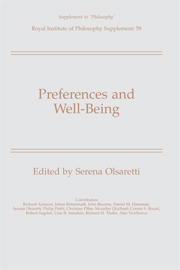Book contents
- Frontmatter
- Contents
- List of Contributors
- “Introduction”
- “Desire Formation and Human Good”
- “Preference Formation and Personal Good”
- “Leading a Life of One's Own: On Well-Being and Narrative Autonomy”
- “Well-Being, Adaptation and Human Limitations”
- “Consequentialism and Preference Formation in Economics and Game Theory”
- “Preferences, Deliberation and Satisfaction”
- “Content-Related and Attitude-Related Reasons for Preferences”
- “Reasoning with Preferences?”
- “Taking Unconsidered Preferences Seriously”
- “Preferences, Paternalism, and Liberty”
- “Preference Change and Interpersonal Comparisons of Welfare”
“Consequentialism and Preference Formation in Economics and Game Theory”
Published online by Cambridge University Press: 07 May 2010
- Frontmatter
- Contents
- List of Contributors
- “Introduction”
- “Desire Formation and Human Good”
- “Preference Formation and Personal Good”
- “Leading a Life of One's Own: On Well-Being and Narrative Autonomy”
- “Well-Being, Adaptation and Human Limitations”
- “Consequentialism and Preference Formation in Economics and Game Theory”
- “Preferences, Deliberation and Satisfaction”
- “Content-Related and Attitude-Related Reasons for Preferences”
- “Reasoning with Preferences?”
- “Taking Unconsidered Preferences Seriously”
- “Preferences, Paternalism, and Liberty”
- “Preference Change and Interpersonal Comparisons of Welfare”
Summary
When students first study expected utility, they are inclined to interpret it as a theory that explains preferences for lotteries in terms of preferences for outcomes. Knowing U($100) and U($0), the agent can calculate that the utility of a gamble of $100 on a fair coin coming up heads is U($100)/2 + U($0)/2. Utilities are indices representing preferences, so in calculating the utility of the gamble, one is apparently giving a causal explanation for the agent's preference for the gamble.
This interpretation of expected utility theory is questionable. It takes expected utility theory to be a theory concerning how agents form preferences over lotteries. But expected utilities only represent preferences; they do not determine them. Though it might be possible and useful to use expected utility theory to guide one's preferences in tricky situations, expected utilities could not be assigned to outcomes in the first place unless agents already had preferences over an infinite set of lotteries.
Rather than regarding expected utility theory as a theory of preference formation, most decision theorists and economists would maintain that one should regard it merely as representing preferences that satisfy its axioms. To the extent that one regards these axioms as requirements of rationality or as reasonable idealizations, expected utility theory places justified constraints on sets of preferences. For example, suppose that for some agent, who cares only about money, the utility of a $100 bet on a fair coin landing heads were not U($100)/2 + U($0)/2.
- Type
- Chapter
- Information
- Preferences and Well-Being , pp. 111 - 130Publisher: Cambridge University PressPrint publication year: 2006



